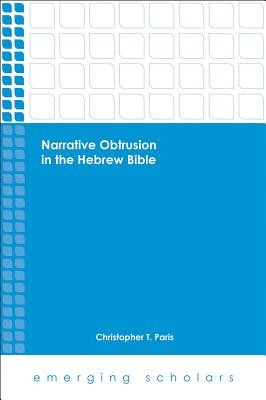
- We will send in 10–14 business days.
- Author: Christopher T Paris
- Publisher: Augsburg Fortress Publishing
- Year: 2014
- Pages: 230
- ISBN-10: 1451482116
- ISBN-13: 9781451482119
- Format: 15.9 x 22.8 x 1.2 cm, minkšti viršeliai
- Language: English
- SAVE -10% with code: EXTRA
Reviews
Description
Narrative critics of the Hebrew Bible often describe the biblical narrators as laconic, terse, or economical. The narrators generally remain in the background, allowing the story to proceed while relying on characters and dialogue to provide necessary information to readers. On those occasions when these narrators add notes to their stories, scholars may characterize such interruptions as asides or redactions.
Christopher T. Paris calls attention to just these narrative interruptions, in which the storyteller breaks frame to provide information about a character or even in order to direct reader understanding and, Paris argues, to prevent undesirable construals or interpretations of the story.
After surveying the phenomenon of omniscient narration and narrative obtrusiveness in the Hebrew Bible and other ancient Near Eastern literature, Paris focuses on the Deuteronomistic History. Here the narrator occasionally obtrudes into the narrative to manage or deflect anticipated reader questions and assumptions, sometimes invoking the divine, sometimes protecting a favored character, in an interpretive stance that Paris compares with the commentary provided by later rabbis and in the Targums. Attention to narrative obtrusion offers an entry point into the world of the narrator, Paris argues, and thus promises to redefine aspects of narrative criticism.
EXTRA 10 % discount with code: EXTRA
The promotion ends in 21d.05:32:57
The discount code is valid when purchasing from 10 €. Discounts do not stack.
- Author: Christopher T Paris
- Publisher: Augsburg Fortress Publishing
- Year: 2014
- Pages: 230
- ISBN-10: 1451482116
- ISBN-13: 9781451482119
- Format: 15.9 x 22.8 x 1.2 cm, minkšti viršeliai
- Language: English English
Narrative critics of the Hebrew Bible often describe the biblical narrators as laconic, terse, or economical. The narrators generally remain in the background, allowing the story to proceed while relying on characters and dialogue to provide necessary information to readers. On those occasions when these narrators add notes to their stories, scholars may characterize such interruptions as asides or redactions.
Christopher T. Paris calls attention to just these narrative interruptions, in which the storyteller breaks frame to provide information about a character or even in order to direct reader understanding and, Paris argues, to prevent undesirable construals or interpretations of the story.
After surveying the phenomenon of omniscient narration and narrative obtrusiveness in the Hebrew Bible and other ancient Near Eastern literature, Paris focuses on the Deuteronomistic History. Here the narrator occasionally obtrudes into the narrative to manage or deflect anticipated reader questions and assumptions, sometimes invoking the divine, sometimes protecting a favored character, in an interpretive stance that Paris compares with the commentary provided by later rabbis and in the Targums. Attention to narrative obtrusion offers an entry point into the world of the narrator, Paris argues, and thus promises to redefine aspects of narrative criticism.


Reviews